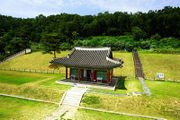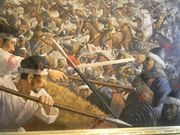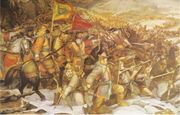"2018 GGHS Team 4"의 두 판 사이의 차이
(→Team Information) |
|||
| (5명의 사용자에 의한 75개의 중간 편집이 숨겨짐) | |||
| 1번째 줄: | 1번째 줄: | ||
| + | {{틀:2018GGHS}} | ||
=Topic= | =Topic= | ||
| − | '''The Lives of | + | [[File:17 goryeogung nae oegyujanggak.jpg|thumbnail|Goryeo Palace Site in Ganghwa Island<ref>[https://www.ganghwa.go.kr/images/tour/images/middle/17_goryeogung_nae_oegyujanggak.jpg 강화 고려궁지]</ref>]] |
| + | '''The Lives of Goryeo People during the Military Regime''' | ||
| − | |||
| − | + | Choe U (崔瑀; 1166 - 1249) was the second Choe dictator of the Ubong Choe military regime. He himself went out on the battlefield to lead in fighting off the Mongolian invasions. Then he realized that the government was no longer safe at the capital city of Kaesong, and so he forced the king Gojong (r. 1213-1259) and his officials to flee to Ganghwa island. He took some of his armies and went to Ganghwa island with them. He did this because he knew that the Mongols would not attempt a naval assault against Ganghwa. Therefore, the Goryeo government was kept safe for several decades even after the Choe regime.<ref>[https://en.wikipedia.org/wiki/Choe_U Choe U]</ref> | |
| − | + | ||
| − | + | ||
| − | + | ||
| − | + | ||
| − | + | ||
| − | + | ||
| − | + | ||
| − | + | ||
| − | =Terms= | + | [[파일:Dfghytk.jpg|thumbnail|Battle of Cheoin during the second Mongolian Invasion of Korea, 1232<ref>[https://www.quora.com/What-happened-to-the-kings-leaders-after-they-surrendered-to-the-mongols-Did-they-continue-to-rule-were-they-replaced-or-were-they-killed Quora]</ref>]] |
| − | *무신정권 武臣政權 (''Musin Jeonggwon''): Goryeo military regime | + | Since the transfer of power, the Choe administration has relied on the geographical advantages of Ganghwa Island rather than providing active resistance to the war. So they enjoyed the same luxury and stayed in office. This is why it is assessed that the transfer of the capital was only aimed at defending the military regime and guaranteeing the safety of some ruling groups, rather than focusing on tactical values or diplomatic strategy.<ref>[http://contents.history.go.kr/front/hm/view.do?treeId=010403&tabId=03&levelId=hm_061_0020 우리역사넷/최우의 호화로운 강화 생활/『고려사절요』권16, 고종안효대왕 3 을사 32년 5월]</ref> |
| + | |||
| + | [[파일:Mongolinvasions.jpg|thumbnail|Koryo's General Kang Kam-chan battling Mongolians<ref>[http://koreanhistory.info/MongolInvasions.htm Korean History Info: The Mongol Invasions]</ref>]] | ||
| + | The Choe administration had never fought against the Mongols in a grand dream struggle, and has only postponed its surrender on Ganghwa Island indefinitely. Rather, they brought various trees to Ganghwa Island, where they formed a wide circle of trees, built large houses, and enjoyed the scenery. Choe and the military rule did not care whether the people were captured and killed or stolen by the Mongol army.<ref>[https://namu.wiki/w/%EC%97%AC%EB%AA%BD%EC%A0%84%EC%9F%81 나무위키/여몽전쟁]</ref> | ||
| + | |||
| + | The tyranny of the military rule to take power made the country's politics difficult.The military rule illegally robbed the people's land and collected more taxes than they had set. Local governments raised taxes on the land to satisfy their greed, making life more difficult for the people.<ref>[http://study.zum.com/book/13353 zum학습백과/무신정변이후 백성들의 봉기]</ref> The military needed more land and more grain to stay in power. | ||
| + | People had to suffer and live a tough life. Uprisings took place frequently under the military regime.<ref>[http://contents.history.go.kr/front/eh/view.do?levelId=eh_n0310_0010 우리역사넷/정중부, 무신들의 세상을 만들다]</ref> | ||
| + | |||
| + | Goryeo was invaded seven times over 30 years by Mongols. The Choe administration continued to live a luxurious life in Ganghwa. On the other hand, people who were abandoned on land suffered all kinds of hardships and the land was devastated. According to ''Goryeosa Jeolyo'', about 206,800 people were taken to Mongolia as prisoners during the fifth invasion and many lives were killed. Then the tax burden began. However, ''Goryeosa Jeolyo'' says the people waited for the Mongol army to come, as too much tax was collected.<ref>[http://www.riss.kr/link?id=M53472 高麗對蒙抗爭史硏究(A Study on the History of Mongol Resistance)/윤용혁]</ref> | ||
| + | |||
| + | =Team Information= | ||
| + | |||
| + | =Presentation Materials= | ||
| + | (Please upload script, ppt etc.here) | ||
| + | ==홍연재 script== | ||
| + | Have you ever heard of Lee Eui-bang, Jung Joong-bu and Lee Eui-min?<br/> | ||
| + | I'm going to present these people's psychology.<br/> | ||
| + | Their psychological transformation comes in the military rule and the inferiority complex they had before the military revolution turned them into superiority.<br/> | ||
| + | As their sense of superiority continues, they have an superiority complex.<br/> | ||
| + | A superiority complex is a state of acting like the best.<br/> | ||
| + | People in this state have the personality to ignore others and show off themselves.<br/> | ||
| + | As such, they take power based on the belief that they are superior, and they are forced and exploited. | ||
| + | |||
| + | =Media= | ||
| + | ==Videos== | ||
| + | |||
| + | =Terms Related to the Topic= | ||
| + | *무신정권 武臣政權 (''Musin Jeonggwon''): Goryeo military regime, Goryeo military rule<ref>[http://digerati.aks.ac.kr:94/Home 武臣政權]-한국학 영문 용어·용례 사전</ref> | ||
**武: martial; military; warlike | **武: martial; military; warlike | ||
**臣: minister; official; statesman; courtier; vassal | **臣: minister; official; statesman; courtier; vassal | ||
**政: government; political; politics; political affairs | **政: government; political; politics; political affairs | ||
**權: authority; power; right | **權: authority; power; right | ||
| − | + | *문인 文人 (''munin''): literati<ref>[http://digerati.aks.ac.kr:94/ 文人]- 한국학 영문 용어·용례 사전</ref> | |
| − | + | **文: literary; writing; culture; formal; language; article; literature | |
| − | + | *무인 武人 (''muin''): military<ref>[http://digerati.aks.ac.kr:94/ 武人]- 한국학 영문 용어·용례 사전</ref> | |
| − | + | **武: martial; military; warlike | |
| − | + | **It was originally translated as 'writers' and 'warriors' by student 박이소. | |
| − | + | *팔방상 八坊廂 (''palbangsang''): eight wards<ref>Shultz EJ, Kang HHW. 2014. ''Koryosa choryo II: Essentials of Koryo History'', Seoul: Jimoodang, pp. 314-5.</ref> | |
| − | + | **八: eight | |
| − | + | **坊: subdivision of a city; neighborhood; subdivision; urban subdivision | |
| − | + | **廂: box (in theater); side room; side-room; theatre box; wing; cabin | |
| + | *출배도감 出排都監 (''Chulbae togam''): Directorate General of Resettlement<ref>Shultz EJ, Kang HHW. 2014. ''Koryosa choryo II: Essentials of Koryo History'', Seoul: Jimoodang, pp. 314-5.</ref> | ||
| + | **出: to go out | ||
| + | **排: a platoon; line up; row of logs or boards; to rank; row; line; to place | ||
| + | **都: all | ||
| + | **監: to supervise; supervisor; prison; control; direct; to inspect | ||
| + | *구제도감 救濟都監 (''Gukje togam''): Directorate General of ? | ||
| + | **救: to rescue; to save; to assist; aid; help; relieve | ||
| + | **濟:aid; to ferry; frugal; cross; economical; to help; relieve | ||
=Resources= | =Resources= | ||
| 39번째 줄: | 67번째 줄: | ||
[http://www.art-and-archaeology.com/korea/ganghwa/gor01.html Goryeo Palace (Goryeogung)]<br/> | [http://www.art-and-archaeology.com/korea/ganghwa/gor01.html Goryeo Palace (Goryeogung)]<br/> | ||
| + | =References= | ||
<references/> | <references/> | ||
2019년 1월 22일 (화) 20:32 기준 최신판
목차
Topic

The Lives of Goryeo People during the Military Regime
Choe U (崔瑀; 1166 - 1249) was the second Choe dictator of the Ubong Choe military regime. He himself went out on the battlefield to lead in fighting off the Mongolian invasions. Then he realized that the government was no longer safe at the capital city of Kaesong, and so he forced the king Gojong (r. 1213-1259) and his officials to flee to Ganghwa island. He took some of his armies and went to Ganghwa island with them. He did this because he knew that the Mongols would not attempt a naval assault against Ganghwa. Therefore, the Goryeo government was kept safe for several decades even after the Choe regime.[2]

Since the transfer of power, the Choe administration has relied on the geographical advantages of Ganghwa Island rather than providing active resistance to the war. So they enjoyed the same luxury and stayed in office. This is why it is assessed that the transfer of the capital was only aimed at defending the military regime and guaranteeing the safety of some ruling groups, rather than focusing on tactical values or diplomatic strategy.[4]

The Choe administration had never fought against the Mongols in a grand dream struggle, and has only postponed its surrender on Ganghwa Island indefinitely. Rather, they brought various trees to Ganghwa Island, where they formed a wide circle of trees, built large houses, and enjoyed the scenery. Choe and the military rule did not care whether the people were captured and killed or stolen by the Mongol army.[6]
The tyranny of the military rule to take power made the country's politics difficult.The military rule illegally robbed the people's land and collected more taxes than they had set. Local governments raised taxes on the land to satisfy their greed, making life more difficult for the people.[7] The military needed more land and more grain to stay in power. People had to suffer and live a tough life. Uprisings took place frequently under the military regime.[8]
Goryeo was invaded seven times over 30 years by Mongols. The Choe administration continued to live a luxurious life in Ganghwa. On the other hand, people who were abandoned on land suffered all kinds of hardships and the land was devastated. According to Goryeosa Jeolyo, about 206,800 people were taken to Mongolia as prisoners during the fifth invasion and many lives were killed. Then the tax burden began. However, Goryeosa Jeolyo says the people waited for the Mongol army to come, as too much tax was collected.[9]
Team Information
Presentation Materials
(Please upload script, ppt etc.here)
홍연재 script
Have you ever heard of Lee Eui-bang, Jung Joong-bu and Lee Eui-min?
I'm going to present these people's psychology.
Their psychological transformation comes in the military rule and the inferiority complex they had before the military revolution turned them into superiority.
As their sense of superiority continues, they have an superiority complex.
A superiority complex is a state of acting like the best.
People in this state have the personality to ignore others and show off themselves.
As such, they take power based on the belief that they are superior, and they are forced and exploited.
Media
Videos
Terms Related to the Topic
- 무신정권 武臣政權 (Musin Jeonggwon): Goryeo military regime, Goryeo military rule[10]
- 武: martial; military; warlike
- 臣: minister; official; statesman; courtier; vassal
- 政: government; political; politics; political affairs
- 權: authority; power; right
- 문인 文人 (munin): literati[11]
- 文: literary; writing; culture; formal; language; article; literature
- 무인 武人 (muin): military[12]
- 武: martial; military; warlike
- It was originally translated as 'writers' and 'warriors' by student 박이소.
- 팔방상 八坊廂 (palbangsang): eight wards[13]
- 八: eight
- 坊: subdivision of a city; neighborhood; subdivision; urban subdivision
- 廂: box (in theater); side room; side-room; theatre box; wing; cabin
- 출배도감 出排都監 (Chulbae togam): Directorate General of Resettlement[14]
- 出: to go out
- 排: a platoon; line up; row of logs or boards; to rank; row; line; to place
- 都: all
- 監: to supervise; supervisor; prison; control; direct; to inspect
- 구제도감 救濟都監 (Gukje togam): Directorate General of ?
- 救: to rescue; to save; to assist; aid; help; relieve
- 濟:aid; to ferry; frugal; cross; economical; to help; relieve
Resources
Goryeo
Mongol Invasions of Korea
Goryeo military regime
Gojong of Goryeo (r. 1213 – 1259)
Choe U
Goryeogung Palace Site (고려궁지)
Goryeo Palace (Goryeogung)
References
- ↑ 강화 고려궁지
- ↑ Choe U
- ↑ Quora
- ↑ 우리역사넷/최우의 호화로운 강화 생활/『고려사절요』권16, 고종안효대왕 3 을사 32년 5월
- ↑ Korean History Info: The Mongol Invasions
- ↑ 나무위키/여몽전쟁
- ↑ zum학습백과/무신정변이후 백성들의 봉기
- ↑ 우리역사넷/정중부, 무신들의 세상을 만들다
- ↑ 高麗對蒙抗爭史硏究(A Study on the History of Mongol Resistance)/윤용혁
- ↑ 武臣政權-한국학 영문 용어·용례 사전
- ↑ 文人- 한국학 영문 용어·용례 사전
- ↑ 武人- 한국학 영문 용어·용례 사전
- ↑ Shultz EJ, Kang HHW. 2014. Koryosa choryo II: Essentials of Koryo History, Seoul: Jimoodang, pp. 314-5.
- ↑ Shultz EJ, Kang HHW. 2014. Koryosa choryo II: Essentials of Koryo History, Seoul: Jimoodang, pp. 314-5.
